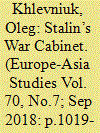| Srl | Item |
| 1 |
ID:
161369


|
|
|
|
|
| Summary/Abstract |
This article compares media representations of how Europe and Russia handled the aftermath of the Chernobyl nuclear disaster in Belarus and Ukraine in the period 1992–2014. It shows that the official and alternative media in Belarus featured competing representations of Europe and Russia that were linked to the national narratives of the Belarusian authorities and opposition, while the official and alternative media in Ukraine carried congruent representations of Europe and Russia that were not linked to the competing national narratives of the political actors. It is further argued that while the media in Belarus constructed its national identity as present-oriented, the media of Ukraine presented its national identity as past-centred.
|
|
|
|
|
|
|
|
|
|
|
|
|
|
|
|
| 2 |
ID:
161371


|
|
|
|
|
| Summary/Abstract |
In this article we examine Russia’s recent public discourse on climate change, with a special focus on the arguments denying anthropogenic climate change. We scrutinise the ways in which denial arguments presented in the media are tied to the changing Russian political and economic context, especially the increasingly authoritarian turn in governance during President Vladimir Putin’s third term in office (Putin 2.0). We conclude that the Russian discourse on climate change emphasises Russia’s Great Power status, identifying its sovereignty and fossil energy as the basis of this status. This discourse refers to key categories, including Russia’s national identity and the spatial–material characteristics of the Russian state.
|
|
|
|
|
|
|
|
|
|
|
|
|
|
|
|
| 3 |
ID:
161368


|
|
|
|
|
| Summary/Abstract |
Jobbik, the Movement for a Better Hungary, is a new generation, radical right-wing political party. In many ways it is similar to other far-right groups in Europe, although it has several unique characteristics. It is a strange anomaly that the party, alone among radical parties in Europe, has pursued a Muslim-friendly policy. Is it an adequate explanation that this anti-Semitic and anti-Israel party considers Muslims its natural allies? Is this relationship solely based on anti-Semitism, or are there deeper explanations?
|
|
|
|
|
|
|
|
|
|
|
|
|
|
|
|
| 4 |
ID:
161370


|
|
|
|
|
| Summary/Abstract |
Since 2010, religious organisations in the Russian Federation have been legally empowered to claim back property confiscated by the state after the October Revolution in 1917. The restitution of church buildings, however, provokes competing claims from different religious and non-religious organisations. Nevertheless, the Russian Orthodox Church has been able to reclaim most of these buildings. This article draws attention to the increase in the power of the Russian Orthodox Church, characterising the interplay between religion and politics in Russia as ‘entangled authorities’. Outcomes of restitution claims are hard to predict and depend on the local setting and the constellations of power.
|
|
|
|
|
|
|
|
|
|
|
|
|
|
|
|
| 5 |
ID:
161367


|
|
|
|
|
| Summary/Abstract |
Amid the extensive literature on the Stalinist dictatorship during the 1930s and the postwar period, the gap in scholarship on the Soviet leadership during the war years is particularly noticeable. This article fills that gap. Stalin’s war cabinet is characterised according to several criteria: first, the formal status of members of the leadership; second, the system of delegating authority; third, the functioning and competency of the structure of collective leadership; and fourth, Stalin’s loyalty to his top associates and the degree of their political immunity. The article demonstrates that the war years saw a relative ‘normalisation’ of the dictatorship. These important changes influenced the subsequent development of the Stalinist system of power and the evolution of Soviet authoritarianism after the dictator’s death.
|
|
|
|
|
|
|
|
|
|
|
|
|
|
|
|
| 6 |
ID:
161373


|
|
|
|
|
| Summary/Abstract |
South Koreans pursuing business opportunities in China have routinely sought assistance from Chinese-born Koreans who possess the linguistic and cultural skills to help make ventures in China successful. While shared ethnicity is a proven resource for furthering transnational business, emphasis on common identity can quickly deteriorate into an emphasis on separate identities. This article examines how shared ethnicity has facilitated business between China and South Korea and how ethnic solidarity has been questioned. The study contributes to discussions about the interplay between cultural identities and transnational business.
|
|
|
|
|
|
|
|
|
|
|
|
|
|
|
|